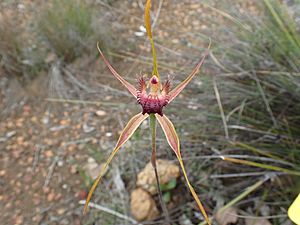King spider orchid facts for kids
Quick facts for kids King spider orchid |
|
|---|---|
 |
|
| Caladenia pectinata growing in Mount Barker | |
| Scientific classification | |
| Genus: |
Caladenia
|
| Species: |
pectinata
|
| Synonyms | |
|
|
The King spider orchid, also known as Caladenia pectinata, is a unique type of orchid. This beautiful flower grows only in the south-west region of Western Australia. It has one upright, hairy leaf. Its large flowers are often red, yellow, and pale green. You can find this orchid most commonly between Bremer Bay and Rocky Gully.
Contents
Discover the King Spider Orchid's Features
The King spider orchid is a plant that grows from the ground. It lives for many years and has an underground tuber. This tuber is like a small storage root. The plant has a single leaf that is usually 150–300 mm (5.9–11.8 in) long and 10–20 mm (0.39–0.79 in) wide. This leaf is also quite hairy.
What Do King Spider Orchid Flowers Look Like?
The King spider orchid can have up to three flowers. These flowers are red, yellow, and pale green. They are quite large, about 60–100 mm (2.4–3.9 in) long and 60–70 mm (2.4–2.8 in) wide. The flowers grow on a tall stalk, which can be 350–700 mm (14–28 in) high.
Parts of the King Spider Orchid Flower
The flower has special parts called sepals. These sepals have thick, brown, club-shaped tips. These tips can be 10–35 mm (0.39–1.38 in) long.
- The top sepal, called the dorsal sepal, stands straight up. It is about 40–70 mm (1.6–2.8 in) long and 2–5 mm (0.079–0.197 in) wide.
- The side sepals, called lateral sepals, are 40–70 mm (1.6–2.8 in) long and 6–9 mm (0.24–0.35 in) wide. They usually point downwards.
- The petals are 35–45 mm (1.4–1.8 in) long and 3–4 mm (0.12–0.16 in) wide. They might spread out or turn upwards.
- The labellum is a special lip-like part of the flower. It is 18–25 mm (0.71–0.98 in) long and 12–18 mm (0.47–0.71 in) wide. It is creamy-yellow with a dark red tip that curves down.
- The sides of the labellum have thin, comb-like teeth. These teeth can be up to 8 mm (0.31 in) long.
- There are also four or six rows of dark red bumps, called calli, along the middle of the labellum.
The King spider orchid usually blooms from late September to October.
How the King Spider Orchid Got Its Name
The scientific name for the King spider orchid, Caladenia pectinata, was first officially described in 1920. This was done by a botanist named Richard Rogers. His description was published in a scientific journal called Transactions and Proceedings of the Royal Society of South Australia.
Meaning Behind the Name
The second part of its scientific name, pectinata, comes from a Latin word. It means "comb-like." This name was chosen because of the comb-like fringe or teeth found on the sides of the flower's labellum.
Where King Spider Orchids Live
The King spider orchid is found in many places across Western Australia. It grows between Cataby and Munglinup. You can find it in several different natural areas. These include the Avon Wheatbelt, Esperance Plains, Geraldton Sandplains, Jarrah Forest, Mallee, Swan Coastal Plain, and Warren regions. It is most common around Bremer Bay and Rocky Gully.
Protecting the King Spider Orchid
The Western Australian Government's Department of Parks and Wildlife keeps track of plant species. They have classified Caladenia pectinata as "not threatened." This means that the King spider orchid is not currently in danger of disappearing.

